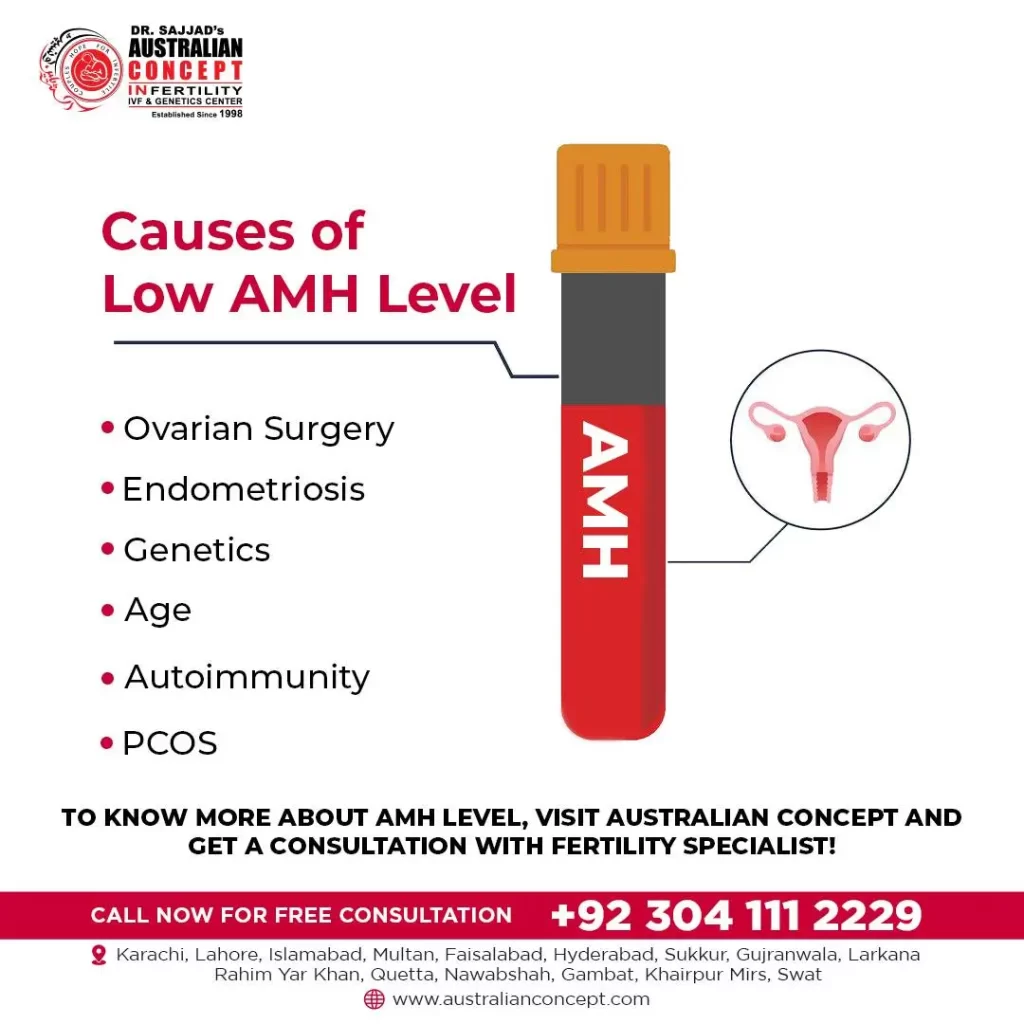Understanding the Causes of Low Anti-Mullerian Hormone Level
Understanding the Causes of Low AMH Levels
Anti-Mullerian Hormone (AMH) is a crucial marker in assessing ovarian reserve and reproductive health. Low AMH levels can be a significant concern for women trying to conceive, as they indicate a reduced number of remaining eggs in the ovaries. Identifying the causes of low AMH levels is essential for determining the most effective fertility treatment options. Here’s an in-depth look at the potential causes and what they mean for your fertility journey.
What is AMH and Why is it Important?
AMH is a hormone produced by the ovarian follicles. It plays a critical role in regulating the growth of follicles and is a reliable indicator of ovarian reserve—the number of eggs available for fertilization. Testing AMH levels helps evaluate a woman’s reproductive potential and guide treatment decisions.

Causes of Low AMH Levels
- Age-Related Decline
One of the most common causes of low AMH levels is age-related decline. As women age, their ovarian reserve naturally diminishes. AMH levels typically start to decrease in a woman’s late 20s and decline more significantly as she approaches her 30s and 40s. This natural reduction in egg quantity and quality can impact fertility, making age a critical factor in assessing reproductive health.
- Premature Ovarian Insufficiency (POI)
Premature ovarian insufficiency (POI), also known as premature menopause, occurs when the ovaries stop functioning before the age of 40. This condition leads to significantly reduced AMH levels as the ovarian follicles become depleted prematurely. POI can result from genetic factors, autoimmune disorders, or other underlying health conditions.
- Genetic Factors
Genetic factors can influence AMH levels and ovarian reserve. Women with certain genetic conditions, such as Turner syndrome or Fragile X syndrome, may experience lower AMH levels due to abnormal ovarian development or function. Genetic testing and consultation with a fertility specialist can help identify if genetic factors are contributing to low AMH levels.
- Medical Treatments and Conditions
Certain medical treatments and conditions can adversely affect AMH levels. Chemotherapy and radiation therapy used to treat cancer can damage ovarian follicles, leading to reduced AMH levels. Additionally, conditions like endometriosis or polycystic ovary syndrome (PCOS) can also impact AMH levels, though they often have different effects on ovarian function.
- Lifestyle Factors
Lifestyle factors can also play a role in AMH levels. Smoking, excessive alcohol consumption, and poor dietary habits can negatively impact ovarian reserve. Maintaining a healthy lifestyle with balanced nutrition, regular exercise, and avoiding harmful substances can help support optimal ovarian function and AMH levels.
- Surgical Interventions
Surgical procedures involving the ovaries, such as ovarian cyst removal or other gynecological surgeries, can potentially affect AMH levels. Depending on the extent of the surgery and the ovarian tissue affected, AMH levels may be lower following such interventions.
- Autoimmune Disorders
Autoimmune disorders, where the body’s immune system mistakenly attacks its tissues, can impact ovarian function and AMH levels. Conditions like autoimmune thyroid disease or systemic lupus erythematosus (SLE) can contribute to decreased ovarian reserve and lower AMH levels.
Managing Low AMH Levels
While low AMH levels indicate reduced ovarian reserve, they do not necessarily mean that pregnancy is impossible. There are several strategies to manage low AMH levels and enhance fertility:
- Fertility Treatments: Options such as IVF treatment can be effective in managing low AMH levels. Advanced technologies and personalized treatment plans can help improve the chances of conception.
- Lifestyle Changes: Adopting a healthy lifestyle, including proper nutrition and exercise, can support overall reproductive health and potentially improve AMH levels.
- Consultation with a Specialist: Consulting with the best fertility doctor in Pakistan can provide tailored advice and treatment plans based on individual needs. Seeking guidance from a top fertility expert can help address specific concerns and explore all available options.
- Cost Considerations: If considering IVF treatment cost in Lahore Pakistan, it is essential to discuss pricing with fertility clinics and explore financial options to manage treatment costs effectively.
Conclusion
Understanding the causes of low AMH levels is crucial for addressing fertility concerns and making informed decisions about treatment. Factors such as age, genetic predispositions, medical conditions, lifestyle choices, and surgical history all play a role in influencing AMH levels.
Consulting with an expert at the best fertility clinic in Pakistan can provide a comprehensive approach to managing these hormonal imbalances and their effects on fertility.

